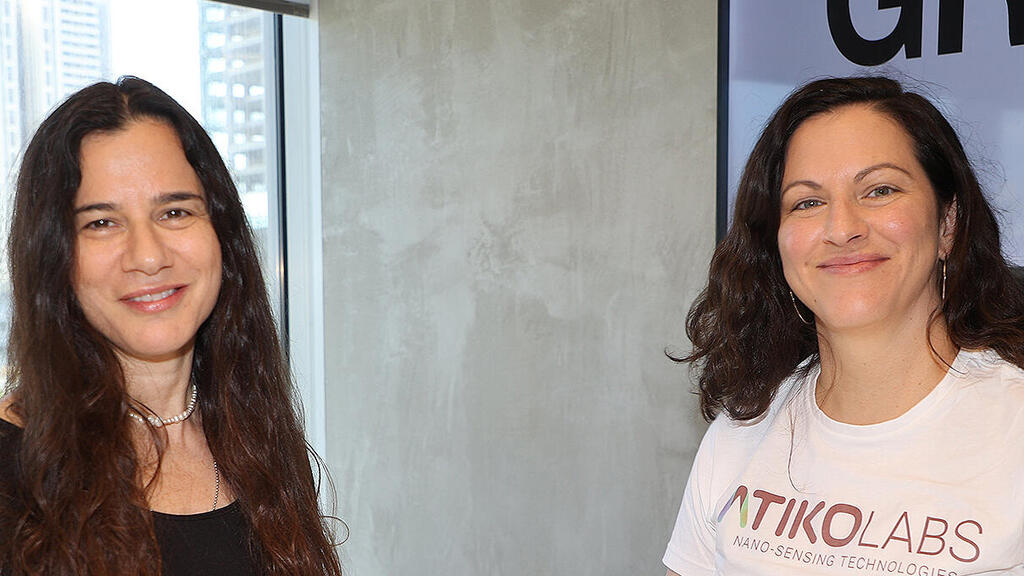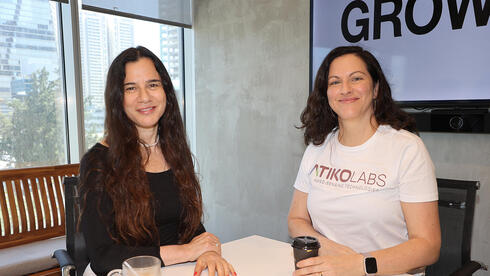
"Startups face many challenges, but should always look to the horizon"
Dafna Nissenbaum, CEO and co-founder of Tipa, and Hadar Tevet, CEO of Atiko Labs, recently met to discuss innovative strategies for tackling contamination and reducing risks in the food and beverage industry. Their conversation was held as part of the Growth+ project by Calcalist and Poalim Tech, which organizes one-on-one counseling and mentoring sessions between experienced entrepreneurs and start-up companies in their early stages
Dafna Nissenbaum, CEO and co-founder of Tipa, and Hadar Tevet, CEO of Atiko Labs, recently met to discuss innovative strategies for tackling contamination and reducing risks in the food and beverage industry. Their conversation, held as part of the Growth+ project by Calcalist and Poalim Tech, which organizes one-on-one counseling and mentoring sessions between experienced entrepreneurs and start-up companies in their early stages, highlighted the importance of resilience, diverse teams, and forward-looking strategies in achieving long-term success.
Tipa develops and manufactures biodegradable packaging while Atiko Labs develops an end-to-end substance detection solution for the food and beverage industry.
Dafna, tell me about a crisis you encountered at the beginning of your journey and what you learned from it that can help young entrepreneurs.
"There was a situation where we were faced with raising money from an investor who gave us a term sheet, and then, as usual, the conditions began to change. The negotiations became aggressive, and we were on the edge of a precipice because it was clear that we had money for only another month. If I didn’t take this money, we might have had to close the company, and the investor probably knew it too. At some point, I decided it was wrong to take on such an investor because they did not fit the company's DNA. I called one of our existing investors, flew to the USA to ask for a bridging loan, and while traveling, I received additional conditions from the same investor. I told him that we would forgo the investment. I knew I had taken a risk, but at the meeting with the investor in the USA, we secured the money, and a year and a half later, we raised substantial funds."
Hadar, what is the biggest difficulty you have encountered recently?
"In the last year, the separations and divisions between the private and national have become very apparent. Our chief scientist is an Arab, and we work well with him, but it requires a lot of effort to ensure we work correctly. Our main challenge in the last year has been to look beyond the current, everyday difficulties. We need to lift our heads, see the big picture of where we want to go five or ten years from now, and find a way to direct ourselves there. I believe that our diverse team, which includes both Arab employees and a balance of women and men, strengthens our ability to withstand difficulties and gives us inner strength that helps us a lot."
Dafna, what did you advise on this matter?
"I was once asked by someone doing due diligence for a company, 'How do you do it?' I said, 'Look to the horizon,' and that's basically the way. There are many challenges every day, but in the end, there is a path that needs to be marked and followed. It can change, but that is the goal."
What did you learn from each other?
Dafna: "One of the things that was important to me when I founded the company was to build a different kind of company, not like the other companies in the market. It is very gratifying to see such Israeli entrepreneurship."
Hadar: "I learned from Dafna about the complex and challenging market penetration, and I see a lot of similarities to what lies ahead for us. I take with me Dafna's approach to handling various pressures from all directions. I liked the focus and loyalty to the inner truth as a value compass for making decisions."
Related articles:
Anything interesting or surprising you learned about each other?
Hadar: "Dafna has five children."
Dafna: "I learned that Hadar has three children, and balancing work and family is challenging. Besides that, she is from a kibbutz, and in my eyes, kibbutz members are the salt of the earth. It's super important, especially these days."
